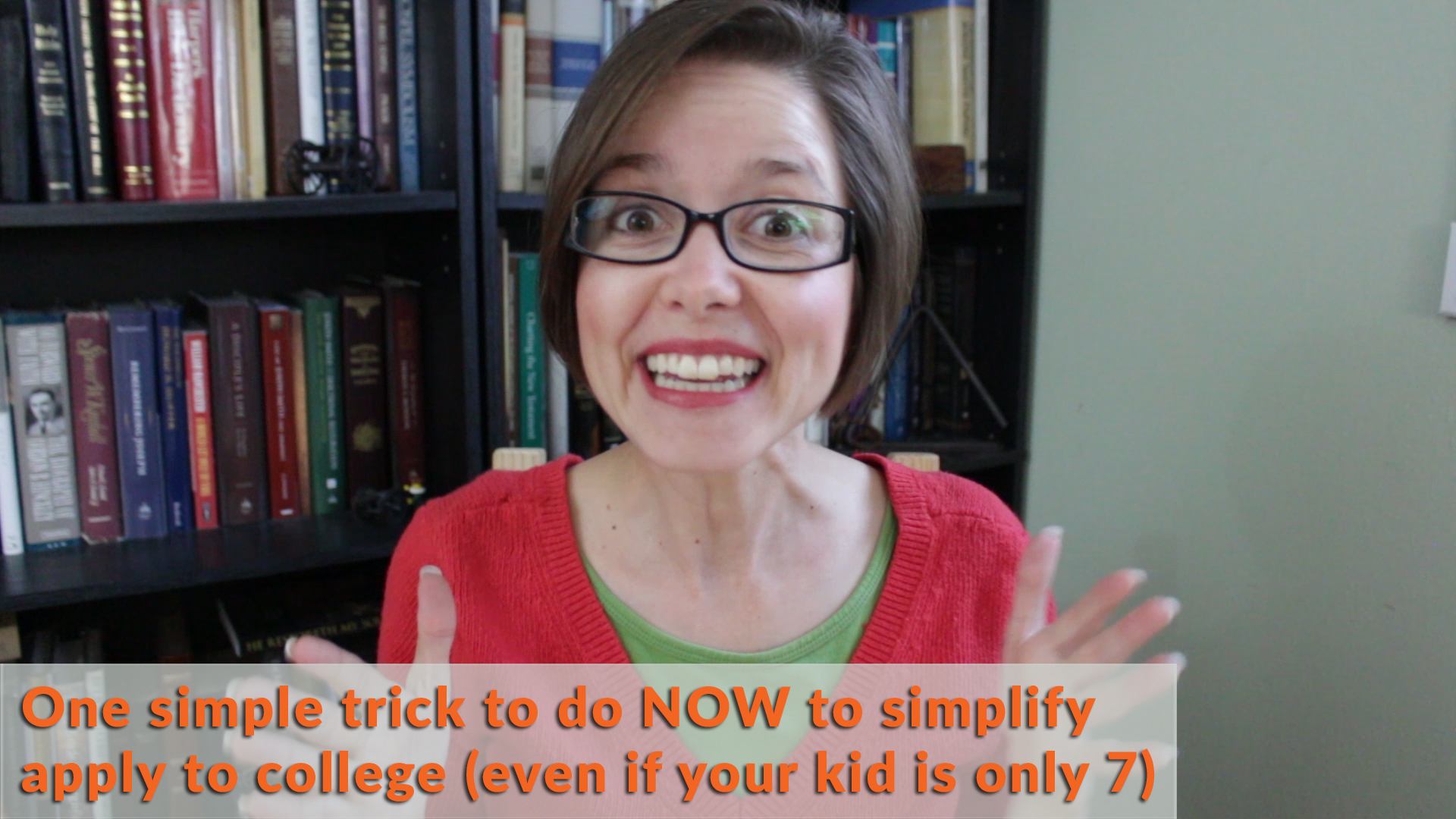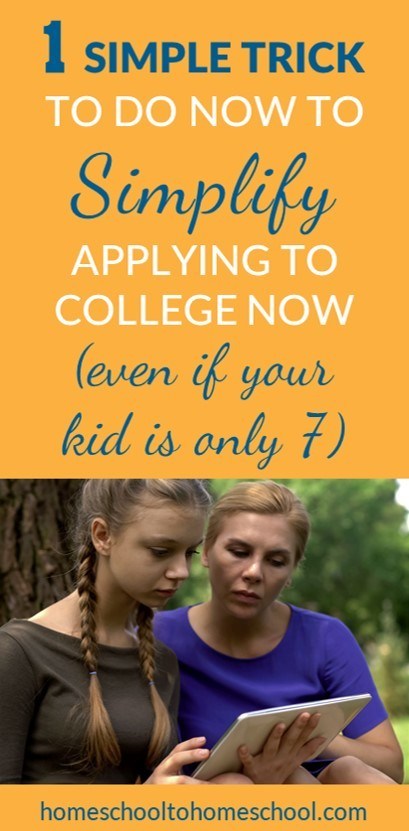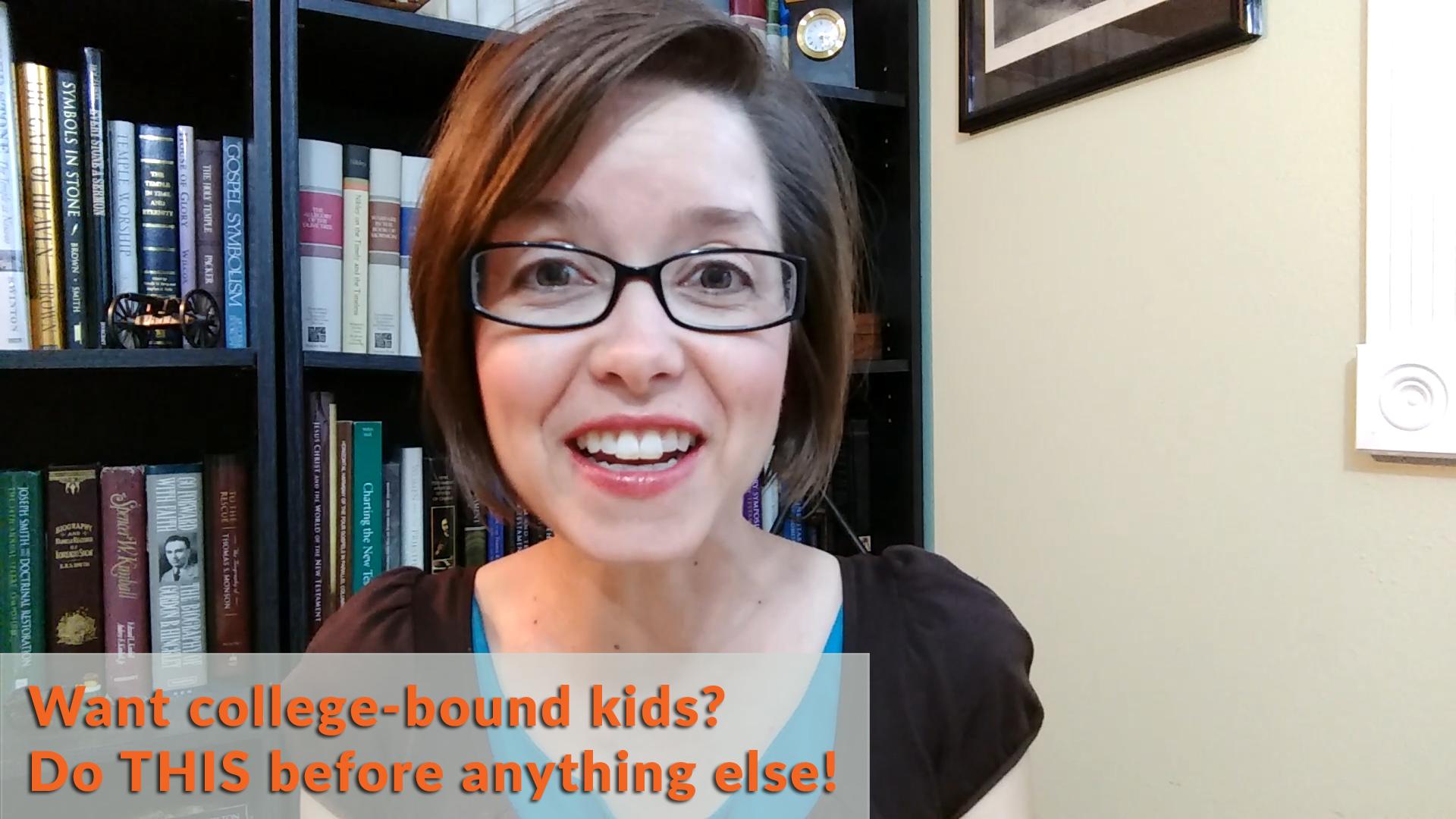How can homeschooled kids be prepared for college?
Have you ever found yourself asking that question?
OR are your kids getting older, and now you’re asking yourself, “Is my homeschooled child ready for college?”
That’s the position I was in just a few months ago!
I was sending my oldest off to college. She’d been homeschooled since she was 3, and I thought we had done a pretty good job.
(There were moments that I wondered … but I had this homeschool trick to keep me going.)
But even after all those years, I didn’t KNOW if she would be okay in college.
Sure - I had done a lot to help her be ready to apply for college. I talk about some of that in this post about making applying for college easier.
And I knew she didn’t need an accredited high school transcript, so we hadn’t worried about that.
But I still worried she hadn’t learned enough or she didn’t have the right life skills.
Would she be able to cook enough to feed herself well every day?
Would she get along with her roommates?
Would she know how to take a test?!?
(Yep! I realized other than the ACT, she had never taken an actual test. I don’t know how I missed that one -- but our schooling focused on other ways to assess learning! Whoops!)
Then I found this AMAZING book called The Self-Driven Child.
I was reading it for other reasons -- learning more about how motivation in children works and how you can increase motivation in your homeschool.
(I created an entire course all about motivating your kids to want to learn that you can check out here!)
And tucked away in the back of the book was the BEST list of questions to ask yourself to see if your child is ready for college.
I recommend the entire book, but in today’s video, I’m sharing the list of questions with you!
This list of questions will help you fully answer the question -- “How do I know if my homeschooled child is ready for college?”
As for us, once I read through I felt MUCH better.
And it turns out I didn’t need to worry. A few months in, and she’s doing great. And she DOES know how to take tests!
Turns out I didn’t need to worry so much after all.
Want to keep reading instead of watch? Scroll to read a transcript of the video.
Simplify preparing college applications (no matter how old your kid is)
Download my Master College Application List Template
Transcript
Hello. This is ToriAnn Perkey, and from my homeschool to your homeschool, today I want to talk about how you can know whether your homeschooled kid is ready for college. I mean, how do you know, especially if they have not done a lot outside of your little homeschool community? Maybe they have taken a couple of classes, maybe they have even taken a class at the high school. You know it depends on your situation, but how do you know if your kid is ready to leave home, fly the nest, and actually tackle that college thing?
Well, today we are going to talk about those, a list of things that you can kind of run down to know whether or not your kid is ready for college. Now, what I am going to tell you is some of these things that I am going to talk about I actually made other videos for. So if you are watching this somewhere other than my blog, feel free to click on the link and check out the link to the actual blog posts. You can see the videos that go along with some of these topics.
Also, I just want to mention that this is a really interesting time period for a homeschool mom and the reason is you have kept your kids close right, and intentionally. A lot of us homeschool because we want to be more involved in our children's lives. We want to be more involved in the education. We want to be a part of the journey and we want to instill our values. We want to help them grow up to be successful adults in an environment that nurtures and respects them.
Regardless of all the reasons that you chose to homeschool, at some point you have to let your kids grow beyond the walls of your home. And that can be a really different experience because you have kept them close. It may be the very first time they've been gone for a long period of time, whether it is just a day by day thing, or they actually move away and go somewhere else.
And so when you start to think about this, it can bring up a lot of emotions, a lot of experience, a lot of thoughts about have I prepared them? Did I do a good job? Have I failed them? You know? And so what we want to do is help our children be prepared and be as successful as possible. We want them to be ready to leave as much as we have worked to keep them close. So what I want to do is just go down a series of questions you can ask yourself.
And all of these questions were listed in a book called "The Self-Driven Child." And I will leave a link to that, you know, down below or up above or wherever you are watching this video. It will also be on my blog. And that book had a whole chapter on your child's readiness for college. Absolutely recommend the book. It is fabulous for lots of reasons, but I loved this chapter in particular. I marked it. I actually found myself calling everyone I know and saying, you are not going to believe what I just found out. There is so much good information here. I wish I had had this years ago.
I am one of those people. So if you have a friend like that, I am sorry because we just get so excited when we find new things that we want to share. So I am excited to share this with you today.
Okay, so lets talk about this. This is all about readiness and there is about one, two, three, four, five, six, seven, eight,nine questions, some sub questions that you are going to ask yourself. So bear with me. We are going to go through these one by one.
1. Does your child understand themselves?
Okay. So number one first question, does your child understand themselves and how they do things best? Do they understand how they go about moving through their day? Do they understand what they are good at and what they need help with? Do they understand themselves? Do they have a sense of self awareness? That is question number one.
2. Can your child self-regulate?
Question number two, can your child self regulate? And what they mean what this book and this list means by self regulate is, are they able to make decisions independent of the people around them, that will be good for them? So particularly, are they able to self regulate against their peers? So if they have a friend who calls them up and says, "Hey, let's go to the restaurant at midnight", and they know that they need to go to bed cause they have a big test the next day. Are they able to say no because they know what is best for them? Are they able to regulate their own environment and be in control of themselves?
3. Is your child self-motivated?
Number three, is your child adequately self-motivated? Who makes their choices about school? So does your child know how to get things done themselves? Do they know how to pick their own classes? Do they know how to know what they want to take? Do they know how to track themselves and plan themselves? Are they able to make decisions about their education independent of you? Now, this does not mean that you completely are not involved. All it means is that they are able to take the lead and you are playing a supporting role. Because if they can not take the lead, then when they are out on their own, they will be lost. Because they will not be able to make those day to day educational choices that are so important in the college environment. Okay, so that was number three.
4. Can your child manage day-to-day living?
Number four, can they manage day to day living independently? Independently means can they do their own laundry? Do they know how to cook? Do they know how to take care of a vehicle if they are going to take a car to college. You are looking at, do they have the life skills to live on their own? And it is unfortunate how many kids go to college who do not have this. Now I do not think this is as much an issue in the homeschool community.
I think that my experience has been that in the homeschool community at large, we are really, really focused on making sure our kids have life skills. And we have the benefit that they have been home to learn those life skills while they are also getting an education. But I do think it is a good thing to ask yourself, do they know how to make doctor's appointments? Do they know how to, you know, get themselves to a doctor's appointment, have a conversation if they need to figure out information, all of that. Okay, so that's number four.
5. Can your child manage stress?
Number five, does your child have a healthy way to manage stress? College is stressful, life is stressful. And how does your child manage themselves when they get stressful? Do they do it in healthy ways? Like go for a bike ride or a walk or exercise? Do they do some kind of calming exercise, whether that's meditation or playing a musical instrument or reading or you know, anything that they do that is a really healthy way to calm down as opposed to watching television, eating, playing video games. There are some really unhealthy ways to manage stress that will not serve them well in the college environment. So just kind of being aware of your child and where are they with their ability to manage stress
6. Is your child burned out?
Okay. Number six is, is your kid burned out? This is a really honest question to ask. We can get in the mindset of, well, my kid is done with high school. It's time to go to college or whatever age they are and just think it is the next step to hit without taking a step back and saying, would they benefit from some time off? Would they benefit from that gap year that happens outside of the United States. Where they go out and they work or they do an internship unpaid or they travel or they do something else.
That allows them to just explore other aspects of their personality and who they are that is not educational. Do they just need a break where they go to work and they come home? How has their educational experience been so far and would they benefit from some time off? So number six is, is your kid burned out? I think it is a really great question to ask and sometimes the answer might be a little hard to come to terms with, but it is a great question to ask.
7. Does your child have adequate academic skills?
Okay, number seven, does your child have the skills they need to do the academic work? Now, hopefully in your homeschool you have been able to somehow navigate them to the place where they are ready to do college work. But you know what? Maybe you haven't, maybe you haven't. Maybe your kid has special needs. Maybe your family has been focused on other things. Maybe you have decided to homeschool in a really alternative way and your kid has a really great education, but maybe does not have some of the skills that are needed in a college level environment.
For example, reading large quantities or listening to large quantities of information. You know, really fast pace because college moves really fast. Do they know how to write at a college level or at a beginning college level? It is easy to track based on your experience at the end of college, so it is at the beginning college level. Do they know how to study for a big exam. These are skills, these are not knowledge. But if they do not have those skills, it might be beneficial to either do some remedial work, remedial when you are going to college, it is not going to feel remedial. But finding ways for them to pick up some of those skills before they start. If you sense that learning those skills on the fly is going to be kind of hard for them. So that is number seven. Do they have the skills to do the academic work required in the college environment?
8. Does your child know how to get support?
Number eight, we are almost done. Does your child know how to ask for support, academic or emotional if they need it? And do they know where to go to get that support? Do they know how to create that support around themselves? A lot of kids struggle in college if they do not know how to get to the academic advisement center. And it is called different things in different universities or colleges, but where they get support for disabilities of any kind. Do they know how to go find for that support and are they willing to ask for it?
Do they know how to recognize when they are struggling in a situation and ask for help from a tutor to take advantage of the writing lab? Schools nowadays provide a plethora of opportunities and support, but the kid has to know how to take it and they have to want to actually go get help. The kids who get help are very successful in college, almost across the board. The ones that do not often struggle. So does your kid know what they need and do they know how to find that? Do they? That is number eight.
9. Can your child manage complex social environments?
Number nine, can your child manage a social environment that is complex? College is a complicated social environment, even more than a high school environment. And if your child has been homeschooled, this may be an area where they have less experience than their peers. Do they know how to handle a large group of people that are all the same age who are jockeying for social position? Do they know how to socially interact and have conversations about topics that are outside of the academic arena?
Do they know how to handle, the romantic relationships that are inevitably going to start happening once they are in a college environment? Do they know how to date? Do they know how to say yes? Do they know how to say no? Do they know how to protect themselves? Do they know how to put themselves in safe places versus unsafe places? These are things that we maybe do not think about when we think about going to college. We think about the academic side. But is your child socially prepared to go? And if they are not, how can you help them prepare? And I think that, in the end, is the real question.
If you see a deficit in any of these areas, what can you do to help improve your child's chances of success? And that may mean taking a break before they actually start the college experience. And only you and they are going together to know how to do that. Now remember, it doesn't have to be perfect. You do not have to say a hundred percent a hundred percent a hundred percent for your kid to be able to go.
My oldest daughter just went to college. We could not say 100% on all of these, but I felt confident enough and I am going to say "enough" because there were moments where I was like, I do not know. I hope she is going to be okay, but she is thriving. She is thriving, and it turns out that she is okay that she is navigating these. The social thing has been a little bit trickier for her. The academic one, she is doing great. I am actually surprised because some of the academic skills that she is doing in college are not the ones that I thought we had practiced at home, but it turns out she had picked them up along the way.
But we had done life skills, we had worked on emotional regulation. We had worked on a lot of this even if we were not at 100%. The other thing is, and I have said this a couple of times, but I am going to say it again. Do not push your kid if they are not ready. That is the number one recipe for failure in college and you do not want that for your kid. Nobody has to go to school at 18 there are so many routes to success.
Some take you through college, some do not. And if you head through college, not everybody has to go to college right out of high school. Not everybody has to do college early. Some people do college at 20, 21, 22 after they have done something else for a couple of years and that is okay. That is okay. As homeschoolers, we are used to tracking differently, taking all different alternate paths. Do not let yourself get trapped in this idea that now that you have done this alternate path up to 18 or whatever age your kid is, now you are going to just jump into the normal rhythm. You have so many choices.
So this is the list. I love this list because it is so comprehensive. It is so much bigger than just, can your kid do a certain type of schoolwork? It is a holistic approach to how do you launch a child into adulthood, into a supportive environment where hopefully they can thrive.
I hope this list has been helpful. If you want to check out more videos about different aspects of this, then go ahead and make sure that you head over to my blog if you are not there already. Watch those other videos.
And I have other resources that are available for you as a homeschool mom, no matter what age your kids are, and I make these videos every week because I want you to be confident. I want you to be successful, and that is why I make those resources. I am ToriAnn Perkey. Thanks for joining me. We will see you next week.
Save for later by pinning to your favorite Pinterest board!
















